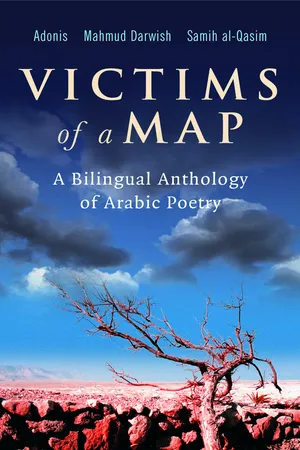
eBook - ePub
Victims of a Map
A Bilingual Anthology of Arabic Poetry (Adonis, Mahmud Darwish, Samih al-Qasim)
Abdullah al-Udhari, Abdullah al-Udhari
This is a test
Partager le livre
- 176 pages
- English
- ePUB (adapté aux mobiles)
- Disponible sur iOS et Android
eBook - ePub
Victims of a Map
A Bilingual Anthology of Arabic Poetry (Adonis, Mahmud Darwish, Samih al-Qasim)
Abdullah al-Udhari, Abdullah al-Udhari
Détails du livre
Aperçu du livre
Table des matières
Citations
À propos de ce livre
Mahmud Darwish, Samih al-Qasim and Adonis are amongst the leading poets in the Arab world today.
Victims of a Map presents some of their finest work in translation, alongside the original Arabic, including thirteen poems by Darwish never before published – in English or Arabic – and a long work by Adonis written during the 1982 siege of Beirut, also published here for the first time.
Foire aux questions
Comment puis-je résilier mon abonnement ?
Il vous suffit de vous rendre dans la section compte dans paramètres et de cliquer sur « Résilier l’abonnement ». C’est aussi simple que cela ! Une fois que vous aurez résilié votre abonnement, il restera actif pour le reste de la période pour laquelle vous avez payé. Découvrez-en plus ici.
Puis-je / comment puis-je télécharger des livres ?
Pour le moment, tous nos livres en format ePub adaptés aux mobiles peuvent être téléchargés via l’application. La plupart de nos PDF sont également disponibles en téléchargement et les autres seront téléchargeables très prochainement. Découvrez-en plus ici.
Quelle est la différence entre les formules tarifaires ?
Les deux abonnements vous donnent un accès complet à la bibliothèque et à toutes les fonctionnalités de Perlego. Les seules différences sont les tarifs ainsi que la période d’abonnement : avec l’abonnement annuel, vous économiserez environ 30 % par rapport à 12 mois d’abonnement mensuel.
Qu’est-ce que Perlego ?
Nous sommes un service d’abonnement à des ouvrages universitaires en ligne, où vous pouvez accéder à toute une bibliothèque pour un prix inférieur à celui d’un seul livre par mois. Avec plus d’un million de livres sur plus de 1 000 sujets, nous avons ce qu’il vous faut ! Découvrez-en plus ici.
Prenez-vous en charge la synthèse vocale ?
Recherchez le symbole Écouter sur votre prochain livre pour voir si vous pouvez l’écouter. L’outil Écouter lit le texte à haute voix pour vous, en surlignant le passage qui est en cours de lecture. Vous pouvez le mettre sur pause, l’accélérer ou le ralentir. Découvrez-en plus ici.
Est-ce que Victims of a Map est un PDF/ePUB en ligne ?
Oui, vous pouvez accéder à Victims of a Map par Abdullah al-Udhari, Abdullah al-Udhari en format PDF et/ou ePUB ainsi qu’à d’autres livres populaires dans Literature et Literary Criticism in Poetry. Nous disposons de plus d’un million d’ouvrages à découvrir dans notre catalogue.
Informations
Sujet
LiteratureSous-sujet
Literary Criticism in PoetryMahmud Darwish
Biographical Note
Mahmud Darwish was born in 1942 in the village of al-Barweh in Palestine. One night in 1948, the Israeli armed forces assaulted the village. The Darwish family fled through a forest, bullets winging overhead, and reached Lebanon, where they remained for more than a year, living on the meagre handouts of the United Nations. Finally, Darwish was led by his uncle back across the border to the village of Deir al-Asad, in Galilee. They could not return to al-Barweh, for it had been obliterated by Israeli soldiers. ‘All that had happened’, Darwish told the Israeli Communist newspaper Zo Hederekh in an interview in 1969, ‘was that the refugee had exchanged his old address for a new one. I had been a refugee in Lebanon, and now I was a refugee in my own country.’
The phrase was not simply metaphorical. Any Palestinian not accounted for in the first Israeli census was regarded by the new Israeli state as an ‘infiltrator’ and was therefore not entitled to an identity card. Darwish had been in Lebanon during the census and thus lived illegally in his own land. He recalled in the Zo Hederekh interview that both the Arab headmaster of his primary school and his parents used to hide him whenever police or other officials made an appearance. In the end, the family told the government that young Darwish had been with one of the Bedouin tribes of the North during the census. He was thus able to acquire an identity card.
Darwish became interested in poetry very early. He read much classical Arab literature when still at school, and in his first poetic attempts, he imitated pre-Islamic poetry. He was soon to find, however, that poetry could land him in serious trouble. He was asked by his headmaster to take part in a celebration, in Deir al-Asad, of the anniversary of the founding of the state of Israel. ‘There’, Darwish says, ‘I stood before the microphone for the first time in my life and read a poem which was an outcry from an Arab boy to a Jewish boy. I don’t remember the poem, but I remember the idea of it: you can play in the sun as you please, and have your toys, but I can’t. You have a house, and I have none. You have celebrations, but I have none. Why can’t we play together?’
The next day, Darwish was summoned by the military governor, who insulted and threatened him. Darwish left the office shaken: ‘I wept bitterly because he concluded by saying, “If you go on writing such poetry, I’ll stop your father working in the quarry.” I couldn’t understand why a poem could disturb the military governor. He was the first Jew I met and talked to. Hi...